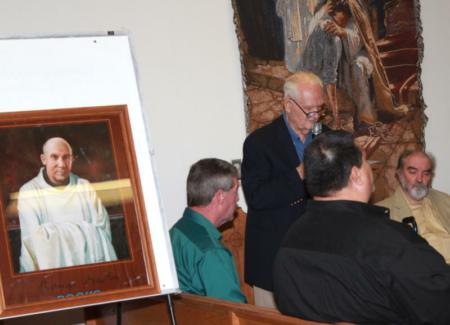Library of books, materials by and about Father Merton now at prison
SHIRLEY, Mass. (CNS) -- A Thomas Merton library dedicated to Worcester Catholics and willed to a Trappist abbey has now been donated to a prison.
The action was a reminder of points Pope Francis made during his recent U.S. visit.
Father Merton, the famed Trappist, was one of the people "outside of the establishment" whom Pope Francis spoke about, Michael W. Higgins said at the Oct. 21 dedication of the John Collins & Edward Farley Thomas Merton Resource & Research Center at a medium-security state prison in Shirley.
Higgins is president of the International Thomas Merton Society and vice president for mission and Catholic identity at Sacred Heart University in Fairfield, Connecticut.
During his visit, Pope Francis pointed to Father Merton and three other Americans as examples to follow. He used their lives to make several points, among them support for "the global abolition of the death penalty" and the belief that "society can only benefit from the rehabilitation of those convicted of crimes."
The other Americans the pope cited were Abraham Lincoln, the Rev. Martin Luther King Jr. and Dorothy Day.
Speaking to Congress Sept. 24, Pope Francis quoted Father Merton talking about being free by nature, in the image of God, but the prisoner of his own violence and selfishness.
"Merton was above all a man of prayer, a thinker who challenged the certitudes of his time and opened new horizons for souls and for the church," the pope said.
"He shares his own woundedness," Higgins said of the Trappist priest. "We all ache into holiness. ... That's why people read Merton. ... They discover a companion on the way. ... He was one of us."
At the dedication prisoners unveiled a sign over the Merton resource and research center housed in Our Lady of Guadalupe Chapel at the Shirley prison.
"I am especially honored to have the center named partially after me and Edward Farley," said John Collins, of St. Mary Parish in Shrewsbury. "My hope is that this will generate enthusiasm on the part of the prison population" to study Father Merton.
Collins started the Merton Society chapter at the Shirley correctional facility -- the only one in a prison. He said he believes this is the second largest collection of Merton materials in the world. The largest is at the Thomas Merton Center at Bellarmine University in Louisville, Kentucky, not far from the Abbey of Gethsemani where the Trappist lived, he said.
Collins said he donated to the prison library, as did other Merton scholars and followers, but the biggest donation is the collection Edward J. Farley of Lowell willed to St. Joseph Abbey in Spencer, the local Trappist community.
Thomas More Farley, son of the late Edward and Margaret Farley, said he asked the monks about donating his father's collection -- which includes about 1,000 books, videos, tapes and other materials -- to the prison chapter. Margaret Farley Lombardi, Thomas' sister, said the monks, who have an extensive Merton library themselves, agreed.
"Our dad would be so pleased with this dedication today," she said. Edward Farley died last April.
Lombardi told the prisoners, "We know that Dad's collection is in the right place. These materials will help each of you to grow in your faith. ... You are in our prayers as you learn about Thomas Merton."
Collins said the story of his work with Edward Farley is recorded in the Merton scholars' autobiography "We Are Already One."
He said they met in the 1980s as fellow educators. He was a school superintendent and adjunct professor various places; Farley was an assistant superintendent in Tewksbury.
In 1991, they started a Merton Society chapter in Bedford, which they ran for 19 years, and in 2002 he started one at his parish that he ran for 11 years. In August 2013 he started the chapter at the Shirley prison -- after prisoners, who saw his Merton columns in The Catholic Free Press, Worcester's diocesan newspaper, asked him to come speak and to come back again.
At the Oct. 21 dedication, Deacon Arthur Rogers, Catholic chaplain at Shirley, thanked God for the Merton collection and said special people wanted it there.
Prisoners shared things they've gained from Father Merton and the chapter.
Shawn Fisher had volunteer Ruth Ste. Marie read Father Merton's poem, "The Five Enemies." It talks about "the robber" and "the respectable citizen" both losing "the original simplicity of man" by love of what dazzles the senses.
"Much like Merton's monastic life, a prisoner can certainly identify with many of the simplicities of life," Fisher said. They can identify with Father Merton's comparison of sacrificial vessels and wood in the ditch, which both came from the same tree.
"(We) all originated from the same place ... our beauty enhanced or diminished by the choices we make," Fisher said. "Yet, as we shed the extravagances of life we find our way back to our original 'simplicity.'"
- - -
Connor is a staff reporter at The Catholic Free Press, newspaper of the Diocese of Worcester.



















